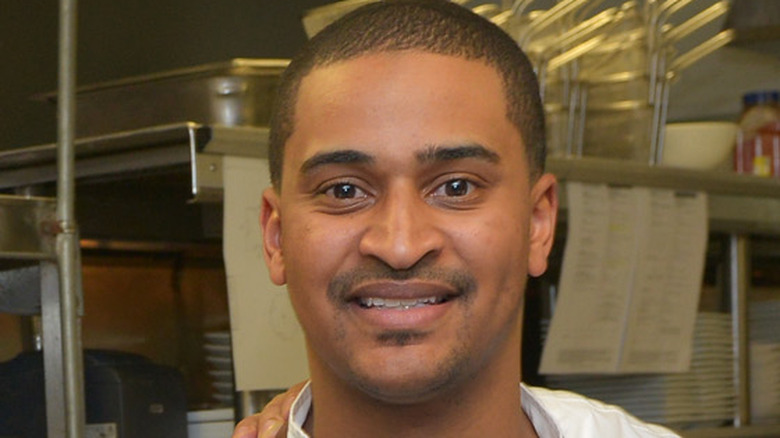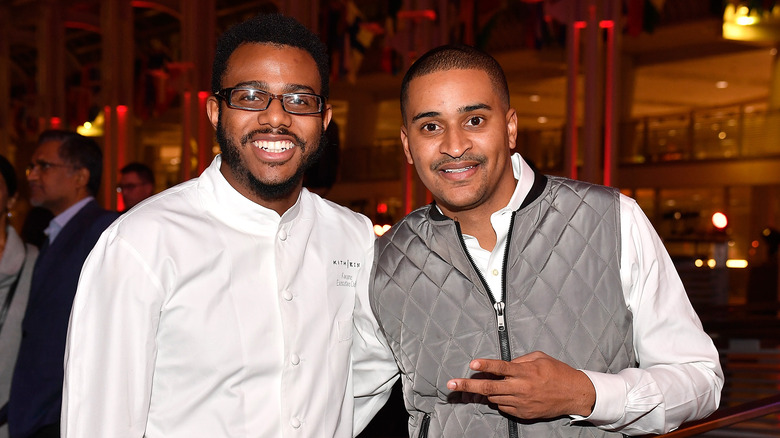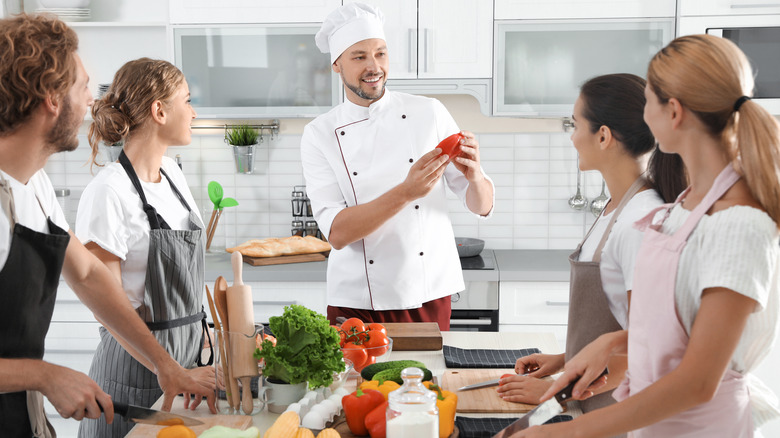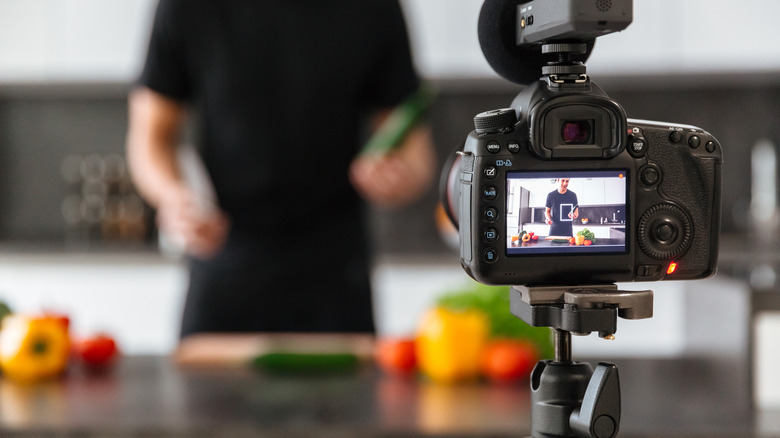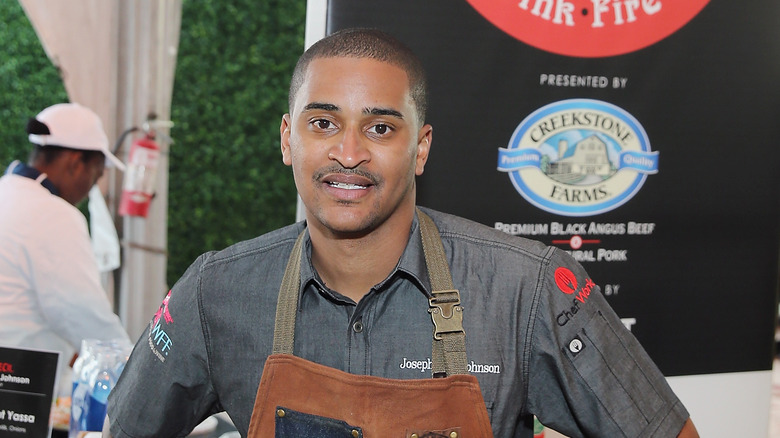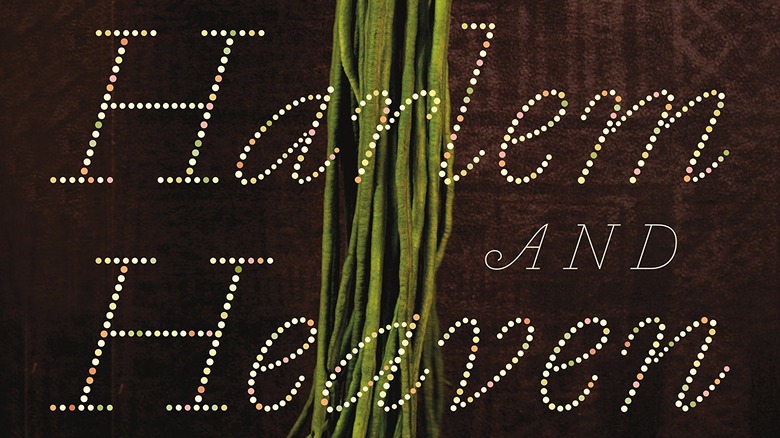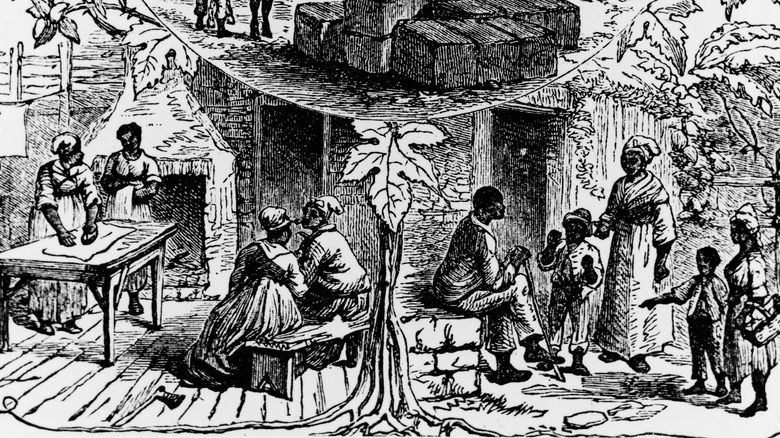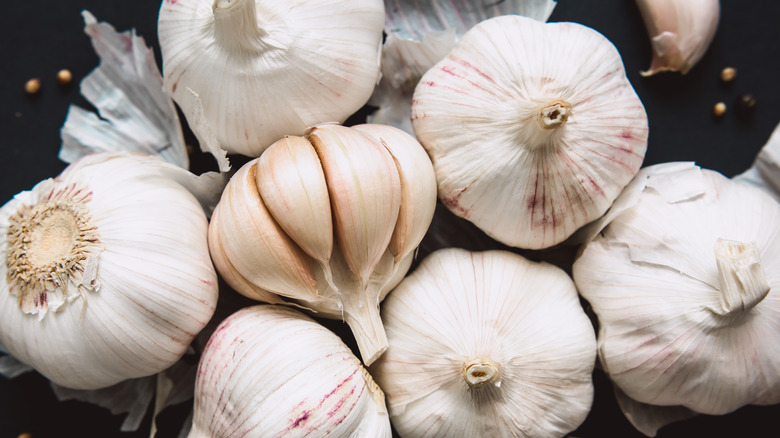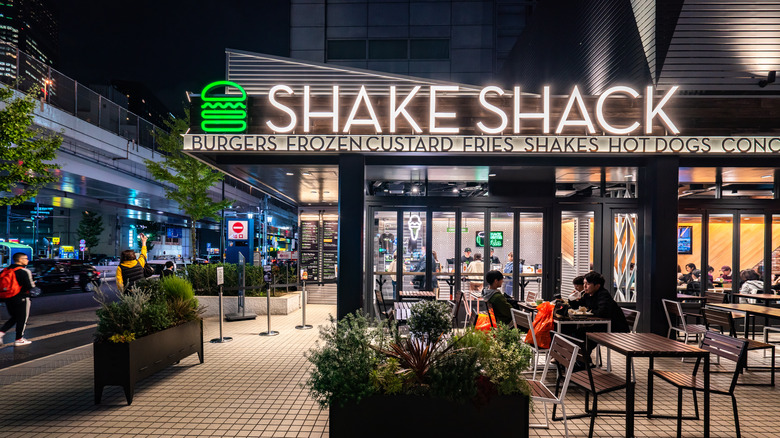Chef JJ Johnson On Childhood Cooking, Respecting Staff, And Rising Black Chefs - Exclusive Interview
We may receive a commission on purchases made from links.
It's little wonder that JJ Johnson is a professional chef — he's been on course for the role since he was four years old, but co-authoring a book that won a James Beard Foundation Book Award and running a successful restaurant business with three locations spread around New York City while appearing on TV cooking shows like "Just Eats with Chef JJ" all before reaching 40 years old? That is a bit of a wonder. Johnson is a hard-working guy who doesn't waste much time.
Thus we were glad he made time for an exclusive Mashed interview where we talked about everything from the early days when he needed a boost to reach the sink and stove to the present, when he recently cooked in front of a live audience at the 2022 Sun Wine and Food Fest at Mohegan Sun, which brought wine connoisseurs and food aficionados from far and wide together for a three-day culinary-centric event.
Johnson also dished on the aspects of cooking that bring him the most joy, the parts of being the boss that bring the most stress, and a few of the dishes you have to try when you make it to one of the locations of Field Trip, as his celebrated trio of restaurants is named.
Chef JJ Johnson's cooking started early
Did you grow up cooking from a young age or did you come to it as you reached adulthood?
No, I've been cooking since I was about four years old. I was cooking in the kitchen with my grandma. She used to play really loud music. I would step up on a milk crate and peel carrots and onions and celery with her — or that's what I thought I was doing. She really injected food DNA into my soul. I used to watch us as a family, a pretty large family, gather around the table every Sunday. I always had the best time of my life around food. The first meal I ever cooked was lasagna for my Aunt Lisa, and I burnt it on her birthday.
I've been cooking my whole life. My first job was a dishwasher, then I went to Culinary School of America. Worked in a bunch of restaurants here in New York City, and now I'm a chef and restaurant owner here in New York City. We have three locations in New York City. Harlem, which we call the OG location, Rockefeller Center in the Concourse level, and at the US Open Tennis Tournament. Field Trip is a rice bowl shop that uses rice as the ingredient to connect everybody through culture. It's a very affordable eatery where you order from the counter. Everything is under $13. I'm a James Beard Award Winning Chef. I've been on Forbes 30 Under 30. What I love to do is connect food, community, and people; I believe that's the best way to bring people together.
Family support meant everything for Johnson
When you were growing up, who were some of your earliest culinary influences?
That was the era of food TV like really starting to pop off. Emeril Lagasse, Julia Child, Galloping Gourmet. I used to watch him on the television religiously with my grandfather. Family, of course. Everybody cooked something. Later on in my high school era, my Uncle Donald was a big influence. He owned a crab boat, and we would have crab cake contests. He would make me eat raw clams and oysters because he said, if I'm going to culinary school, I want to be a chef, I need to know what things taste like. So he tortured me a little bit, but a lot of those things I loved then I love now. I think it was a mixture of everything.
My family knew I wanted to be a chef. When I really look back in life, they actually cultivated me. [You know] that elite, AAU basketball player, that parents would be traveling around the country with them, going to all these tournaments to try to get seen by Division One Schools? My family would be bringing me to restaurants, would be cooking food, would be having pig roasts. Everything was based around food and was really cultivating me to see if this was something I really wanted to do. Then, in culinary school, at Culinary School of America, I wanted to quit a couple times, but my dad really kept me going. He said, "You won't be a quitter."
Was there one specific moment when you realized, yes, this is the right choice for me, this is going to be my career, I'm going to make my life in food?
I graduated from the Culinary School of America with my Associate's Degree. I promised my mom I would get my bachelor's, but I didn't want to do it at Culinary School of America. I wanted to go to a regular university for two more years and do it. I got accepted at Seton Hall — many people don't know this. I started to realize while I was at Seton Hall University, that the language that I spoke? I wanted to talk about food all the time. Everybody else was talking about other things. After the first semester, I had to get out of there. It wasn't for me.
So, $37,000 of figuring out that you want to cook food? People would really make fun of me and be like, "Oh, you want to cook? Oh, that's crazy. What's that?" I did meet some really good friends, but that was a moment of, "OK, I want to be in food for the rest of my life. This is my calling. How can I maneuver through the industry and really learn?"
Johnson talks cooking on camera vs. cooking live
What are the biggest challenges of cooking on camera?
Connecting with the folks on the other side of the screen. You don't really know if what you're doing or what you're saying is really connecting with people. My belief is. I always lead with food. I believe food is the biggest connector. I can give you food tips, or cooking tips, or show you how to do something you've been trying to do, or something that you know how to do, but slightly better, and "lead with food," that means we can connect through the screen. That's what I do. Early on in my career, it was rough. At the Mohegan Sun Food Festival, I did my demo, and I think it was one of the best demos I did.
I really connected with the crowd. It was actually the first time I was in a place where — most of the time, I do know some of the people in the crowd or they know me — this time, it was just me and my team. Maybe one person was like,: "JJ, I love you!" I was able to really connect. It was leading through food. I did spicy rigatoni, but my way. Piri-Piri Sauce, that's in my restaurant that I love to use, bring home and cook rigatoni with, because I like a spicy rigatoni. In that moment, I can see people like: "Whoa, I never thought of this," or "How can I do this?" I was leading through food and giving techniques.
Next thing I know, myself and the crowd were interacting really well together. That's the hardest part when you're on television, it's just you and the camera. You got to be able to talk through the lens [to] somebody on the other side.
When Chef JJ Johnson is in the zone
What's some most fun you've had cooking with or for other people?
There's a couple moments that I really love in my career. I love when I'm behind the line at Field Trip, my restaurant, and I'm cooking that day. We're packaging up the bowls and I can see people's faces. They're eating it sitting down, and they're getting smiles on their faces. Those are always some of my special moments, not because we're here talking about Mohegan Sun, but it was definitely a great moment for me in touching base with the crowd [there], and them coming to purchase my cookbooks afterwards. Building new fans and friends.
I have to say, the Mohegan Sun Festival is really an amazing festival. I would love to give props to them because they really take care of the chefs — they treat them like they are music artists coming to perform there. You don't see that a lot. That was really important to me. As I left from there, I was like, "Wow, they really made sure that I was good. They really made sure all the other chefs were good." I think that's really important, because chefs get asked to do so many festivals from time to time. Sometimes, we come out of our pocket to be there to market ourselves or to market our restaurant. Here was this very equal playing field, like, "I know you're here to do this, but I also know you need this to be here." That was really important for me.
One of my ultimate times of cooking in a restaurant is when I did a residency at Chef's Club and Ayesha Curry and Steph Curry came. At that time, their CEO, who's a dear friend of mine, convinced them to come eat at Chef Club instead of Carbone. They really felt some type of way, because they didn't know what they were getting themselves into. At the end of that meal — Steph started off, when he came through the restaurant, it was a handshake — at the end of the meal, high fives. That was a moment for me that was like, "Oh, wow, your food can really break through to people and give them a really amazing dining experience." I would say those are some of my top three moments in my career.
The challenges of running restaurants
What are some of the biggest challenges of working in and running professional kitchens?
It's a people business that we're in. The industry's been really based on a place where the people aren't treated well. I think for me, as I've been growing through the industry — I remember when I was becoming a chef, the first time I would say to my friends, "Hey guys, we're Executive Chefs. We got to make sure everybody gets two days off in a row," I look back and say, "That's what I wanted to make sure people were going to get, was two days off in a row? Shame on me!"
That's what's always hard for me — developing a culture that exists for people to be in a safe space, have a good work-to-personal life balance, and make a livable wage. That's something [I want] as a restaurant owner, a chef, is creating that culture that hopefully trickles in and around the industry, to give people those same values and morals to treat their staff in the right capacity.
The Field Trip dishes to try and the cookbook process
How would you explain your take on Afro-Asian cuisine to someone?
I cook the food of the people. It just happens to be around the movement — how people moved and where they went. Just global style of food. It's fusion and melting pot flavors.
What are a few of the dishes that best exemplify it? If someone's going to come to one of your restaurants and only can try one or two dishes, what are the ones they have to have?
When you're coming to Field Trip, you got to get our legendary Piri-Piri Salmon. It comes with pineapple black fried rice, our wok vegetables, with our collard greens, butternut squash, and Brussels sprouts. You got to pick up a Crab Pocket, which is like a freshly made Crab Rangoon, with fresh crab meat and house made cream cheese. I love our shrimp bowl with the coconut sticky rice, green curry and fresh chili peppers.
How do you approach writing a cookbook? How do you choose the theme? How do you select which recipes will be included and how do you choose those that are going to have to be left out?
Cookbooks take a long time, so you have to predict, two years from now, what do people want to read? If you start today, it's not coming out today. Two years from now, what are people going to read and what does the world want? That's how I look when I'm writing cookbooks. [For] "Between Harlem and Heaven," I think it was educating folks on what's Afro Asian American cooking or the food of the African diaspora. Also, making sure that book would stay on the shelf similar to like Marcus Samuelsson's "Aquavit," or Thomas Keller's, French Laundry book. Those are classic cookbooks. That's how I envision when we were writing that book. In future books to come, [it's] "What do I believe people want? What do people want to read? What's a void in the space where people are trying to learn something about?"
JJ Johnson on the ascendence of Black chefs
What are some things you wish more people knew about Southern food, West African food, and about the crossover between the two?
I wish people would know that Southern food is the true foundation of American culture. When you think about across the gambit, rice was part of the Gold Rush era. That's how people were becoming millionaires. That's how it was fueling our country. The South is based on agriculture, which is the foundation of America. West Africa is a contributor to American culture. The West African slaves are the backbone of America. They're the ones that built it. [Thing emerge] out of that. There's music, there's food, there's culture. When you think about history, you can't change history. All you can do is talk about it, and people will react differently to it. There's nothing you can do about that. If we use food as the vessel to talk about history, then you can't really sway people a different way because they're using food to learn about history. That's what I do.
How do you feel about this moment when finally people are starting to recognize that American culinary history is basically African American culinary history?
Overall, right now, all black people are getting the credit for what to do. If you look at culinary, when hotels were built, when there was food in hotels, who was running hotels? Who were the chefs? They were black. Who was the President's Chef? Hemingway. He was black. Going back to what we were just talking about, history — nobody wants to talk about the actuality of history, which could actually bridge these gaps of bias. It's good to start seeing Black people getting credit. It's good to see that the rooms are more diverse. It's good to see that people are investing in black people. It's good to see it.
The biggest thing ... when you look at the Forbes list of the richest families in the world, every family started with an entrepreneur. That entrepreneur had somebody to go to make that idea potentially become alive. Black people don't have that. They don't have anybody to go to. If you were the most talented cook in your community, you couldn't go to anybody to get a restaurant built for you. Who was going to give you the money? The bank wasn't going to give you the money. There was nobody to give. There's nobody in your family. Everybody's working. We're all doing the same work.
That's what's good to see, is that black entrepreneurs in all sectors of business, are getting their credit and able to bring their ideas to life. Hopefully, one day, in that list of Richest Families, there'll be a Black family or a couple Black families there that can say, "We started with an idea. Now we're here."
Johnson's tips for cooks and favorite ingredient
What are some common mistakes that you see amateur chefs making? What are some tips you have for the home cook who wants to improve some?
Cooking is an art. You got to keep practicing. It's not something that happens overnight. In culinary school, one of my chefs said, "If your knife cuts were as good as your haircuts, you would be really good." My haircuts would be perfectly lined. I would make sure the barber was doing that right. That's always in the back of my mind. I tell all young cooks, keep working at it. Keep pushing. Keep believing in the food. TV is there. If you're going to be on TV, it's going to happen, but without the deliciousness of food, it doesn't work.
For the home cook, you got to buy the right utensils for the right job. You got to keep your knives sharp. You got to invest in some good pots and pans. You got to invest in the right stuff. That's what will make cooking easier. You'll get through the process a lot simpler. Those are always my pieces of advice to the home cook.
Is there one single ingredient that you can't live without?
Salt, maybe. I don't think I could live without garlic. Garlic is something that is so versatile. You can use it raw. You can use it lightly sautéed. You can use it golden brown. It gives different flavors in different ways. Garlic is in a lot of foundations of my cooking. It's not something you'd see me go without.
JJ Johnson on fast food and Guy Fieri
Do you have any favorite fast foods?
I love Shake Shack. You can't beat that. I'm a pizza snob. At Mohegan Sun, when I was there, the snowstorm was there. I saw Frankie Pepe and I was like, "Oh, are they coming in today? Cause I want that pizza." Those would be my things. On road trips, you get stuck eating McDonald's because they own the roadway. Then, it's the Filet-o-Fish, that's where I go to on that kind of night.
Who's one chef you would love to have cook a meal for you?
There's a lot of people out there. I'd probably go with Guy Fieri. His energy in the kitchen is going to be popping. We're going to be drinking some tequila and beer. It'll be a really good time, so I'm going to go with Guy Fieri. He's going to light it up. It's going to be comforting. It's going to be delicious. I hear he is a really nice person.
Learn more about the Mohegan Sun festival at their website, and follow Chef Johnson on his personal website and Instagram page.
